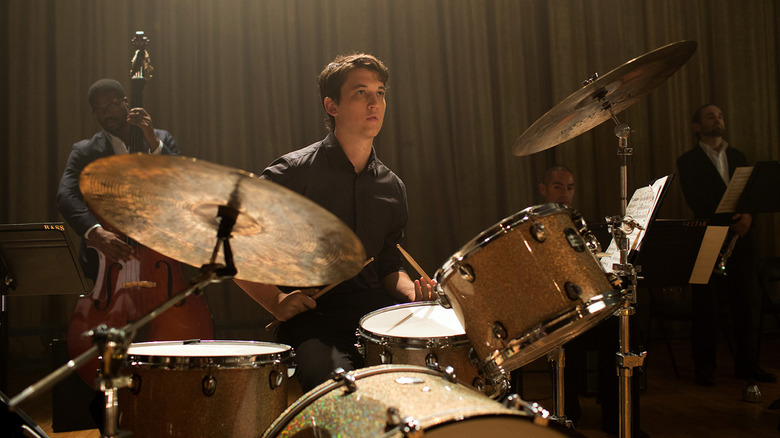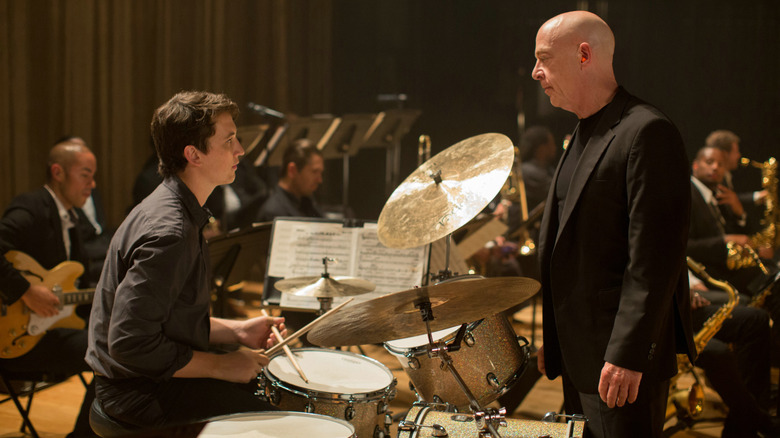Damien Chazelle Sees Whiplash As A Twisted Sort Of 'Origin Story'
The message of Damien Chazelle's bloody 2014 film "Whiplash" is a direct counterargument to arguments typically heard in college movies. In most cases, when a college student finds themselves pushing themselves to the point of burnout — a trope seen in films like "Real Genius," "Good Will Hunting," or even "Legally Blonde" — the movie stops to let the characters know that relaxation, breaks, parties, and friendship can take precedence, even if it's temporary. Don't lose sight of your humanity. If the school demands more than 100% from its students, it's typically depicted as a negative, as in James Bridges' "The Paper Chase." In all cases, hard-nosed and demanding professors typically read as villains, sometimes even sadists, too eager to tear down students who don't meet their too-exacting standards.
"Whiplash," in contrast, argues that in order to truly learn and achieve greatness, a student has to endure all kinds of torture. The film follows the antagonistic relationship between Andrew Nieman (Miles Teller), an ambitious jazz drummer, and Prof. Terence Fletcher (J.K. Simmons), a ruthless man who believes in abusive motivation. Andrew is just talented enough to get on Fletcher's bad side and, frustratingly, Andrew always takes his advice. Over the course of the film, Andrew practices until his hands bleed, then keeps practicing. He spends more and more time in the rehearsal room. He breaks up with his girlfriend and communicates with his family less and less. He does all this to impress Fletcher.
Fletcher, meanwhile, says out loud that comfort and encouragement are antithetical to ambition. Nothing, he says, is more harmful than the words "good job." Only pain and outrage can lead to greatness that will leave a permanent mark on the music world.
By the end of the film, everything Fletcher says will prove to be right.
The Joker origin story
Simmons, it should be noted, won an Academy Award for his performance.
In a 2014 interview with Interview Magazine, Chazelle talked a little bit more about his beliefs on the matter, notably pertaining to Fletcher's motivations. Like any sort of abuse, the director seems to feel that Fletcher's propensity to abuse others was an inherited trait. Not much of the professor's backstory is explored in "Whiplash," but Chazelle did have something of a biography in mind, especially when he began to see how Andrew's behavior altered to match Fletcher's. It was, to put it in more contemporary parlance, his Joker origin story. Chazelle said:
"J.K. and I talked a little a bit about how that kind of behavior gets passed down. And I think in many ways the movie is almost a weird origin story for a new Fletcher, or an instrumentalist version of Fletcher. In the sense that Andrew's basically become Fletcher by the end. He's just the flipside; he's the Fletcher who actually plays an instrument. Andrew starts to exhibit the same type of cruelty, and that was very much part of the design of the character. I didn't want to give any specific backstory elements to Fletcher himself but I think he was certainly pushed very hard."
It wasn't until after the pair had talked over the characters, and that Chazelle had arranged musical training for his actor that he learned that Simmons already possessed a degree in composition and conducting and was a skilled singer.
Whether or not Simmons himself also had a Fletcher-type professor in his life — one who was eager to teach by toughness — must remain in the realm of speculation. Regardless, Simmons' performance was excellent. And terrifying.

